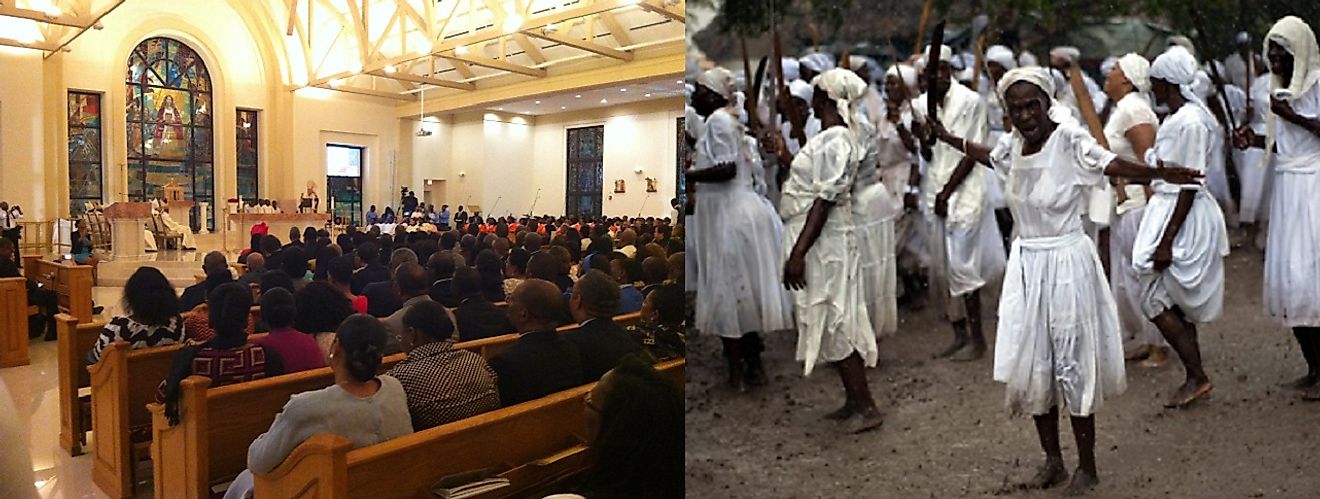Religious Beliefs In Haiti

Haiti has been largely a Christian country for several hundred years after the Spanish, and then the French, colonized the Caribbean island nation before it became a sovereign state. Roman Catholicism is by far the largest Christian denomination in the country. Roman Catholics are estimated to be 80% of the Haitian population. There is also the influence of the West African religious practices which was brought by the Slaves and some of the indigenous American practices, which is similar to the Cuban Santeria. The Haitian society to some extent is made up of a multi-religious community, and the government does not interfere with such organizations.
Roman Catholic Christianity and Catholic-Voodoo Syncretism
Roman Catholics in Haiti constitute around 80% of the entire national population. The religion is highly modified and mixed up with the traditional voodoo which is made up of the religious traditions from the West Africa and some native beliefs. The impact of the French in their new colonies is directly related to the prevalence of Catholicism in Haiti as it was their colonial master. The constitution had Catholic as the official state religion until 1986 when it was removed. Religious liberty in the country has allowed other religions to flourish.The Catholic Church has had an uneasy relationship with the voodoo practice over its lifetime in the country. At the end of the American occupation in the 1930s, the small number of priests available ministered mainly to the urban elite where voodoo is rare. Catholic priests later launched campaigns targeted at destroying the religion. Later, some elements of the folk religion got into the liturgy. The constitution put in place in 1987 allowed for the practice of the faith. The church has therefore allowed for particular aspects of these native religions. The impact and power of the Pope were evident in 1983 when he criticized the government during his visit. The leader Mr. Jean Claude Duvalier got deposed about three years later. To ensure efficient administration of the church affairs, Haiti is divided into ten dioceses and two archdioceses.
Protestant Christianity
The Protestants comprise around 16% of the total Haitian population, and the number of adherents to the faith has been increasing significantly over recent years. The Protestants are mainly Baptists, Pentecostals, Adventists, and other smaller groups. Unlike the Catholics, they completely denounce the practice of voodoo as a vice. Other statistics to point out that Protestants make up more than a third of the country’s population.
Islam
The Muslims on the island are estimated to number 3,000, which translates to 0.04% of the population of Haiti. The Muslim leaders state that the number is closer to 5,000, and that many of them are unaccounted for in the taking of national censuses. The Muslims in the country trace their origin to the slave trade where most of them first came into the country as slaves. When slavery ended, they were left in the country as free citizens.
Judaism
There are no official records indicating the numbers of Haitian Jews among the Haitian population. They started migrating into the country during the first days of European colonial power. A significant number also came into the country during the 1940s fleeing persecution from Hitler’s Nazi Germany.
Impact of Religion in Haiti
The overwhelming majority of Haitian citizens identify with at least some sort of religious group. They believe in the presence of a greater power who determines the fates of all men. To seek that power's blessings, they offer sacrifices, engage in religious festivals, and perform ceremonies, among other activities.
Religious Beliefs In Haiti
| Rank | Belief System | Share of Population in Haiti |
|---|---|---|
| 1 | Roman Catholic Christianity (including Catholic-Vodou Syncretism) | 80% |
| 2 | Protestant Christianity | 16% |
| 3 | Atheism or Agnosticism | 1% |
| Baha'i Faith, Islam, Judaism, Eastern Religions, and Other Beliefs | 3% |







